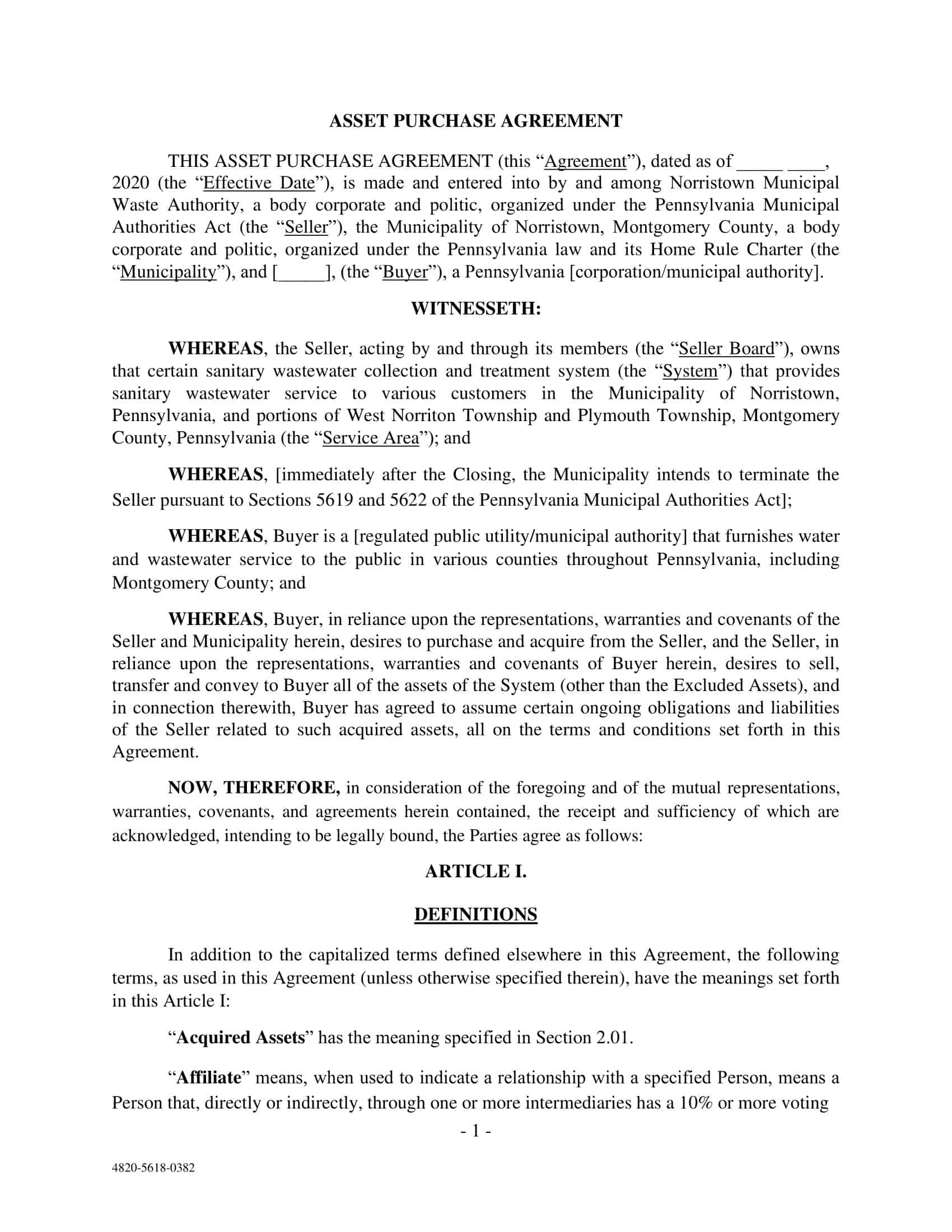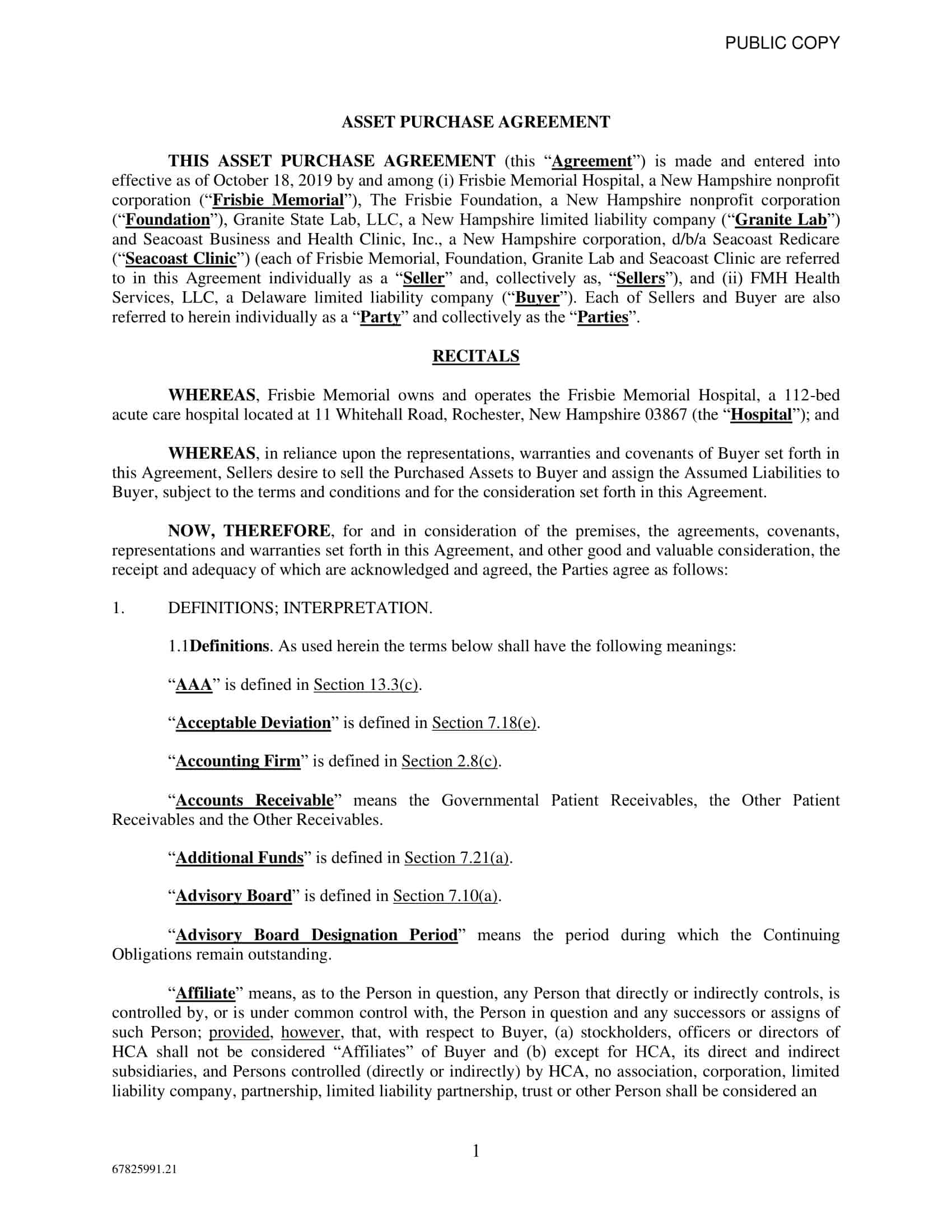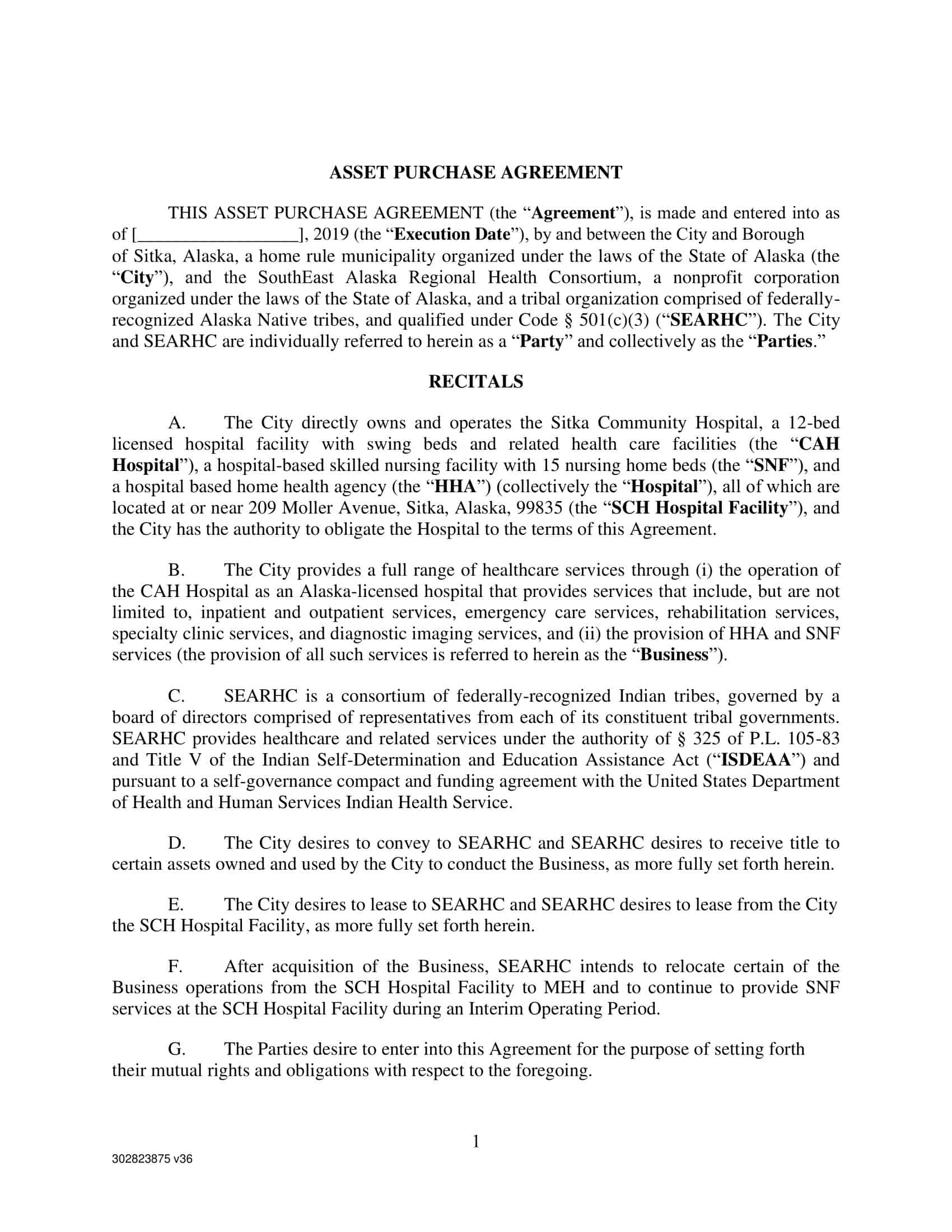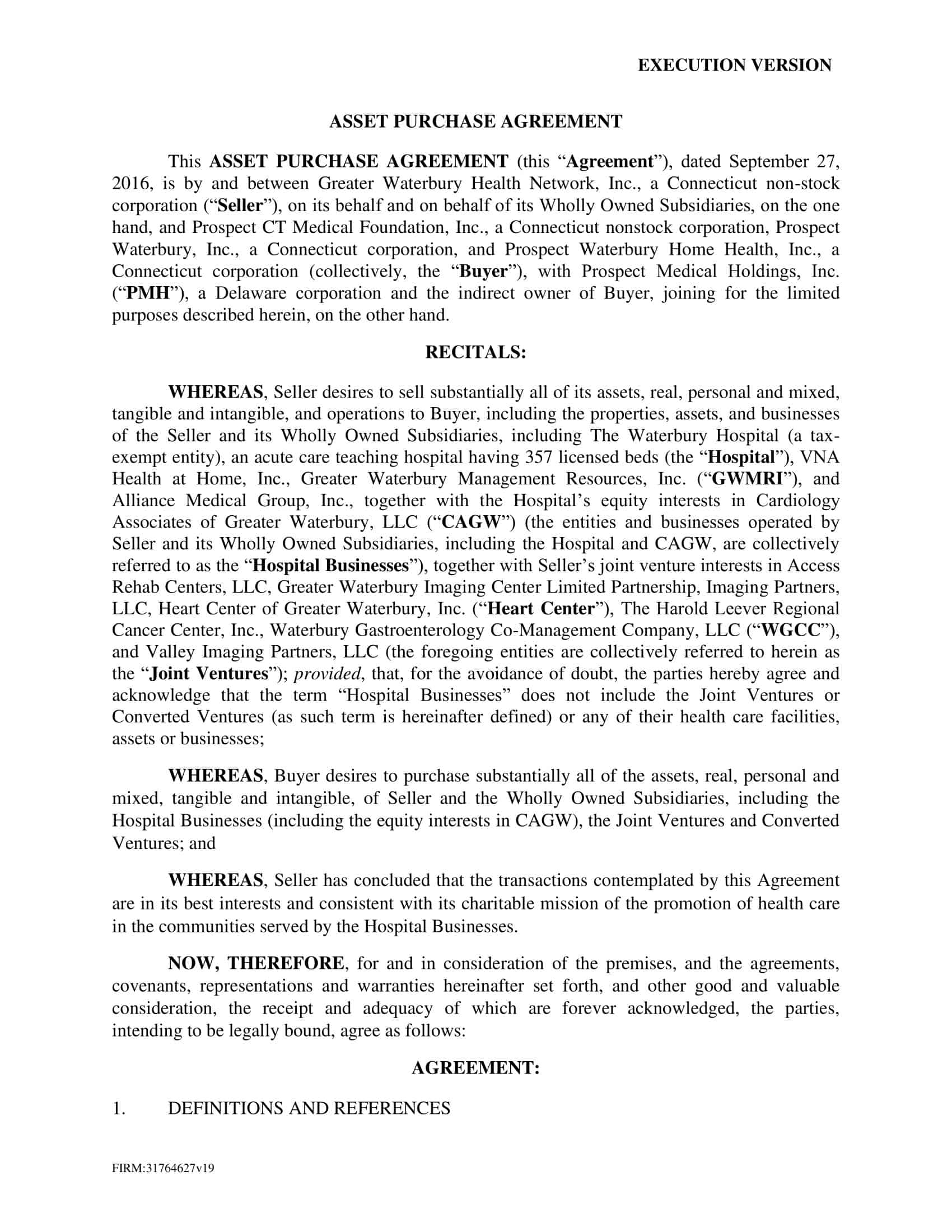As businesses grow and evolve, their owners may need to consider selling them for a variety of reasons. Whether it’s to retire, pursue other ventures, or simply cash out, selling a business requires careful planning and negotiation to ensure a smooth transition of ownership. One of the key decisions that both the buyer and seller must make is how to structure the sale.
Depending on the specific circumstances, the buyer may opt to purchase all of the assets and shares of the company, or just a select few. Regardless of the approach, it’s essential to document the terms of the sale in an asset sale agreement that outlines the assets being sold, their condition, and the purchase price. This legal document serves to protect both parties and avoid potential disputes down the road.
Table of Contents
Asset Purchase Agreement Templates
An Asset Purchase Agreement is a legally binding document that outlines the terms and conditions for the purchase and sale of specific assets between two parties. It is commonly used in business transactions where one party (the buyer) wishes to acquire certain assets from another party (the seller). The Asset Purchase Agreement Template provides a comprehensive framework for creating this agreement.
It is important to note that an Asset Purchase Agreement should be carefully tailored to the specific transaction and the legal requirements of the jurisdiction in which it is being used. Consulting with legal professionals is recommended to ensure compliance with applicable laws and regulations.
Asset Purchase Agreement Templates can be customized using word processing software or online templates. They provide a comprehensive and structured framework for documenting the terms and conditions of asset transactions, protecting the interests of both the buyer and the seller. By utilizing an Asset Purchase Agreement Template, parties can establish a clear understanding of the transaction, mitigate potential risks, and ensure a smooth transfer of assets.
What is an Asset Purchase Agreement?

An Asset Purchase Agreement (APA) is a legally binding agreement between a buyer and a seller that outlines the terms and conditions of the sale of certain assets. The assets being sold can include tangible and intangible assets such as property, equipment, inventory, customer lists, patents, and trademarks. The APA sets out the purchase price and payment terms, along with any warranties, representations, and indemnification provisions related to the assets being sold.
The agreement also includes other provisions, such as those related to the transfer of employees and customer contracts, as well as any other terms negotiated between the parties. The APA is a crucial document that governs the transfer of assets between the buyer and seller and helps to mitigate the risks associated with such transactions.
Importance of a business asset purchase agreement
A business asset purchase agreement is important for several reasons:
Legally binding document: An asset purchase agreement is a legally binding document that outlines the terms and conditions of the sale of assets. It serves as a contract between the buyer and the seller and can be enforced in court if necessary.
Clarity and certainty: The agreement helps to ensure that both parties have a clear understanding of what is being sold, the purchase price, and other terms and conditions of the sale. This can help to prevent misunderstandings and disputes down the road.
Asset protection: The agreement helps to protect both the buyer and the seller’s assets. It ensures that the buyer is getting the assets they paid for, and the seller is being paid the agreed-upon price for those assets.
Risk management: The agreement includes provisions for warranties, representations, and indemnification, which help to manage the risks associated with the sale of assets. This can help to protect both parties from any unforeseen liabilities or risks that may arise after the sale.
Compliance: The agreement includes provisions for the transfer of any necessary licenses, permits, and contracts associated with the assets being sold. This helps to ensure that both parties are in compliance with any legal or regulatory requirements associated with the sale.
In summary, a business asset purchase agreement is important as it provides clarity, certainty, and legal protection to both parties involved in the sale of assets, while also helping to manage risks and ensure compliance with legal and regulatory requirements.
When Would You Use an Asset Purchase Agreement?
An asset purchase agreement is typically used in situations where a buyer is interested in purchasing some or all of the assets of a business, rather than buying the entire business as a going concern. Here are some specific situations in which an asset purchase agreement may be used:
Sale of a division or business unit: A company may decide to sell a particular division or business unit to another company, and an asset purchase agreement would be used to facilitate the transfer of the assets associated with that division or unit.
Purchase of specific assets: A buyer may be interested in purchasing specific assets, such as equipment, real estate, or intellectual property, and an asset purchase agreement would be used to transfer ownership of those assets.
Bankruptcy or liquidation: In the event of bankruptcy or liquidation, an asset purchase agreement may be used to sell off the assets of a company to pay creditors or distribute funds to shareholders.
Change of ownership: When a business changes ownership, an asset purchase agreement may be used to transfer ownership of the assets to the new owner.
Expansion or acquisition: A company may want to acquire the assets of another company as part of an expansion or acquisition strategy, and an asset purchase agreement would be used to transfer ownership of those assets.
Parts of an Asset Purchase Agreement
An Asset Purchase Agreement typically includes several key parts or sections, which may vary based on the specific details and terms of the transaction. Some of the most common parts of an Asset Purchase Agreement are:
Parties: This section identifies the buyer and seller involved in the transaction and any other relevant parties, such as guarantors or lenders.
Assets: This section outlines the specific assets being sold, which may include tangible assets such as equipment and inventory, as well as intangible assets such as intellectual property, customer lists, or contracts.
Purchase Price: This section details the price to be paid by the buyer to the seller for the assets, as well as any payment terms or financing arrangements.
Representations and Warranties: This section includes statements made by the seller about the assets being sold, such as their condition, ownership, and legal compliance. These representations and warranties help to protect the buyer in case any of the statements are untrue.
Closing Conditions: This section outlines any conditions that must be met before the sale can be completed, such as obtaining necessary licenses or permits, or obtaining approval from third parties.
Indemnification: This section outlines the parties’ responsibilities and liabilities regarding any damages or losses that may occur after the sale, and how such losses will be allocated and compensated.
Dispute Resolution: This section outlines the process for resolving disputes that may arise between the parties.
Governing Law: This section specifies the law that will govern the agreement and any disputes that may arise.
Signatures: This section includes the signatures of both the buyer and the seller, indicating their agreement to the terms of the Asset Purchase Agreement.
Advantages and Disadvantages of an Asset Purchase Agreement
An Asset Purchase Agreement (APA) is a legal document that outlines the terms and conditions of a transaction where a company sells or purchases certain assets, such as equipment, intellectual property, or real estate. Here are some advantages and disadvantages of using an Asset Purchase Agreement:
Advantages:
Flexibility
An APA allows the buyer and seller to negotiate the specific assets being sold and the terms of the transaction, providing greater flexibility than other types of mergers and acquisitions.
Limited Liability
An APA limits the buyer’s liability to the assets purchased, providing some protection against unknown or potential liabilities of the seller.
Tax Benefits
An APA can offer tax benefits to the buyer, as the purchase price can be allocated to specific assets for tax purposes.
Customizable Terms: The terms of an APA can be tailored to the specific needs of the buyer and seller, including the payment structure, warranties and representations, and closing conditions.
Reduced Complexity
In some cases, an APA can be less complex than other types of acquisitions, such as a stock purchase, as it only involves the transfer of specific assets and not the entire company.
Disadvantages:
Potential Hidden Liabilities
An APA may not provide full protection against undisclosed or hidden liabilities of the seller, which may only become apparent after the transaction is completed.
Potential Loss of Goodwill
If the seller is a well-established business with strong brand recognition, the buyer may lose some of the seller’s goodwill by not acquiring the entire company.
Additional Transaction Costs
An APA can involve additional transaction costs, such as legal and accounting fees, due diligence expenses, and the need to obtain third-party consents for the transfer of certain assets.
Difficulties in Valuation
Valuing individual assets can be difficult and may require the use of third-party experts to assess the value of intangible assets such as intellectual property.
Potential for Disputes
The specificity of an APA can lead to disputes over the interpretation of the terms of the agreement, particularly with respect to representations and warranties.
It is important for both the buyer and the seller to carefully consider the advantages and disadvantages of an APA before entering into such an agreement.
What assets can you buy in an asset purchase agreement?
An Asset Purchase Agreement (APA) is a legal document that outlines the terms and conditions of a transaction where a company sells or purchases certain assets. The specific assets that can be purchased in an APA can vary depending on the agreement between the buyer and the seller, but some common types of assets that can be purchased include:
Tangible assets: These are physical assets that can be touched, such as buildings, machinery, inventory, furniture, and equipment.
Intangible assets: These are assets that do not have physical form, such as trademarks, patents, copyrights, software, and goodwill.
Intellectual property: This includes all types of intangible assets that relate to creativity, such as patents, trademarks, copyrights, and trade secrets.
Contracts: This includes all types of agreements, such as sales contracts, lease agreements, employment contracts, and supplier contracts.
Real estate: This includes land, buildings, and other types of property.
Accounts receivable: These are amounts owed to the seller by customers or clients, which the buyer can purchase as part of the agreement.
Inventory: This includes all types of goods and materials held for sale or for use in the business.
Trade secrets: These are confidential information, formulas, or processes that are used in the business and provide a competitive advantage.
Customer lists: This includes all types of information related to customers, such as names, addresses, phone numbers, and purchasing history.
Licenses and permits: This includes all types of permits and licenses required for the business to operate, such as zoning permits, environmental permits, and occupational licenses.
Domain names and websites: This includes all types of online assets, such as domain names, websites, social media accounts, and other digital properties.
FAQs
What are the benefits of using an Asset Purchase Agreement?
The benefits of using an Asset Purchase Agreement include: providing a clear framework for the sale of assets, mitigating risks associated with the transaction, protecting the interests of both parties, and reducing the potential for disputes.
How is an Asset Purchase Agreement different from a stock purchase agreement?
An Asset Purchase Agreement is used to transfer ownership of specific assets from the seller to the buyer, whereas a stock purchase agreement is used to transfer ownership of the entire business, including all of its assets and liabilities.
What is due diligence, and how does it relate to an Asset Purchase Agreement?
Due diligence is the process of conducting a thorough investigation of the assets being sold to ensure that they are accurately represented and that there are no hidden liabilities. Due diligence is an important component of an Asset Purchase Agreement because it helps to ensure that the buyer is fully informed about the assets being purchased and the associated risks.
What happens if one of the parties breaches the terms of an Asset Purchase Agreement?
If one of the parties breaches the terms of an Asset Purchase Agreement, the other party may have legal remedies available, such as terminating the agreement, seeking damages, or specific performance.
Do I need a lawyer to draft an Asset Purchase Agreement?
It is highly recommended to have a lawyer draft an Asset Purchase Agreement. A lawyer can ensure that the agreement accurately reflects the terms and conditions of the transaction, provides adequate protection to both parties, and complies with all relevant laws and regulations.
What are some common provisions in an Asset Purchase Agreement?
Some common provisions in an Asset Purchase Agreement may include: the specific assets being sold, the purchase price, representations and warranties about the assets, closing conditions, non-compete agreements, indemnification provisions, and dispute resolution mechanisms.
What is the difference between an Asset Purchase Agreement and a Bill of Sale?
An Asset Purchase Agreement is a more comprehensive document that outlines the terms and conditions of the sale of assets, whereas a Bill of Sale is a shorter document that serves as a receipt for the transfer of ownership of the assets.
What is an indemnification provision in an Asset Purchase Agreement?
An indemnification provision in an Asset Purchase Agreement is a clause that outlines which party will be responsible for any losses, damages, or liabilities that arise from the sale of assets. It may also specify the scope and limitations of the indemnification.
How can a buyer protect themselves in an Asset Purchase Agreement?
A buyer can protect themselves in an Asset Purchase Agreement by conducting due diligence, negotiating favorable terms and conditions, including representations and warranties from the seller about the assets being sold, and including indemnification provisions to protect against unexpected liabilities.
How long does an Asset Purchase Agreement last?
An Asset Purchase Agreement typically lasts until the transaction is completed, which may include the transfer of ownership of the assets and payment of the purchase price. However, some provisions, such as non-compete clauses or indemnification provisions, may have longer durations.
Can an Asset Purchase Agreement be amended or modified after it has been signed?
Yes, an Asset Purchase Agreement can be amended or modified after it has been signed if both parties agree to the changes and the changes are documented in writing.
What is the role of a mediator in an Asset Purchase Agreement?
A mediator may be used in an Asset Purchase Agreement to help resolve disputes that arise between the buyer and the seller. The mediator acts as a neutral third party to facilitate communication and negotiation between the parties. However, if mediation is unsuccessful, the parties may need to resort to other forms of dispute resolution, such as arbitration or litigation.









































![Free Printable Roommate Agreement Templates [Word, PDF] 1 Roommate Agreement](https://www.typecalendar.com/wp-content/uploads/2023/06/Roommate-Agreement-150x150.jpg)
![Free Printable Payment Agreement Templates [PDF, Word] 2 Payment Agreement](https://www.typecalendar.com/wp-content/uploads/2023/05/Payment-Agreement-1-150x150.jpg)
![Free Printable Credit Card Authorization Form Templates [PDF, Word, Excel] 3 Credit Card Authorization Form](https://www.typecalendar.com/wp-content/uploads/2023/06/Credit-Card-Authorization-Form-150x150.jpg)
